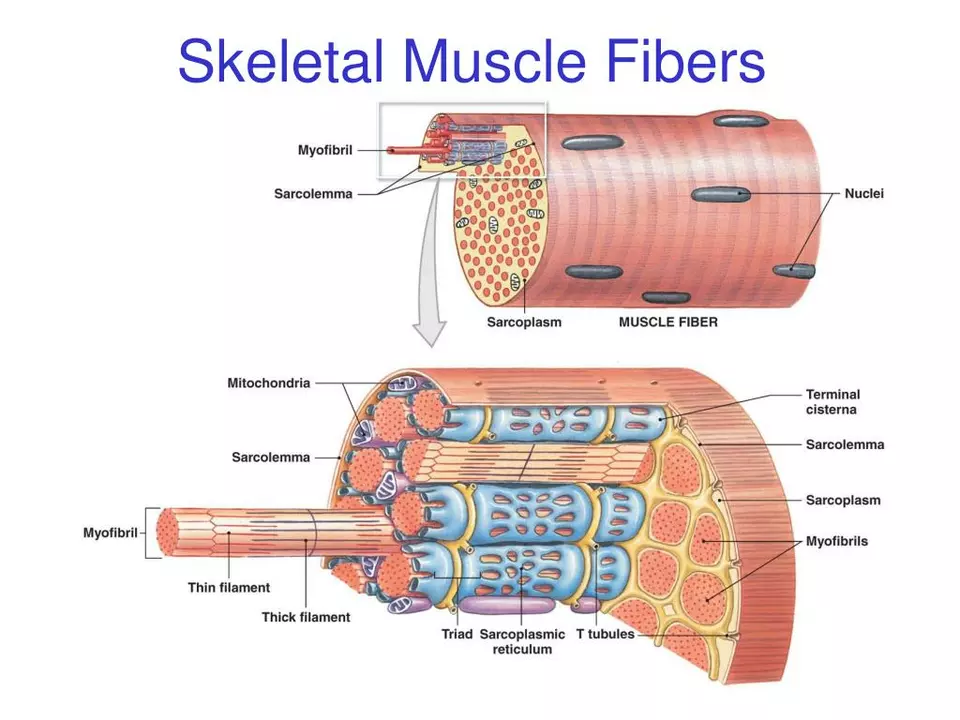Understanding the Basics of Genetics and Skeletal Muscle
In order to fully comprehend the role of genetics in skeletal muscle conditions, it is important to first understand the basics of genetics and how they relate to our muscles. Genetics is the study of heredity, or how traits are passed down from one generation to another through our genes. Genes are segments of DNA that contain the instructions for making proteins, which are essential for the proper functioning of our bodies. Our skeletal muscles, in particular, are composed of bundles of muscle fibers, each containing numerous individual muscle cells.
There are many genes that play a role in the development, maintenance, and repair of our skeletal muscles. Some of these genes are responsible for determining the size, shape, and strength of our muscles, while others are involved in regulating the way our muscles contract and respond to exercise. In this article, we will explore the role of genetics in various skeletal muscle conditions, and how understanding these genetic factors can help us better manage and treat these conditions.
The Genetic Basis of Muscular Dystrophies
Muscular dystrophies are a group of inherited, progressive muscle disorders characterized by muscle weakness and wasting. There are several different types of muscular dystrophies, each caused by mutations in specific genes that affect the structure or function of muscle fibers. Some of the most common forms of muscular dystrophy include Duchenne muscular dystrophy (DMD), Becker muscular dystrophy (BMD), and myotonic dystrophy.
Duchenne and Becker muscular dystrophies are both caused by mutations in the dystrophin gene, which is responsible for producing a protein called dystrophin. This protein is essential for maintaining the structural integrity of muscle fibers, and a lack of functional dystrophin can lead to muscle damage and degeneration. In the case of myotonic dystrophy, the genetic mutation affects a different gene and results in the production of an abnormal protein that disrupts the normal function of muscle cells.
Understanding the specific genetic mutations responsible for these disorders has been crucial in the development of potential therapies and treatments for muscular dystrophies. For example, researchers are currently exploring gene therapy approaches that aim to correct or replace the faulty genes in affected individuals, as well as drug therapies that target the underlying genetic defects.
Genetics and Muscle Strength: The Role of Myostatin
Myostatin is a protein that plays a crucial role in regulating muscle growth and development. It acts as a negative regulator of muscle mass, meaning that it inhibits the growth of muscle fibers. Variations in the myostatin gene can lead to differences in muscle size and strength among individuals. For example, some people have naturally lower levels of myostatin, which allows their muscles to grow larger and stronger than average. Conversely, higher levels of myostatin can result in smaller, weaker muscles.
Research into the genetic basis of muscle strength has led to the discovery of certain gene variants associated with increased muscle mass and performance. These findings have potential implications for the fields of sports medicine and athletic training, as well as for the development of new therapies for muscle wasting disorders. For instance, scientists are currently investigating the possibility of developing drugs that can inhibit myostatin, which could potentially help individuals with muscle atrophy regain strength and function.
Inherited Metabolic Myopathies and Their Genetic Causes
Metabolic myopathies are a group of inherited disorders that affect the way our bodies break down and use energy to fuel muscle contractions. These conditions can result in muscle weakness, exercise intolerance, and muscle pain. There are several different types of metabolic myopathies, each caused by mutations in specific genes that affect various aspects of muscle metabolism.
For example, glycogen storage diseases are a type of metabolic myopathy caused by mutations in genes that regulate the breakdown of glycogen, a primary source of energy for our muscles. Other forms of metabolic myopathies are caused by mutations in genes that affect the way our muscles process fats or proteins for energy. Identifying the specific genetic mutations responsible for these disorders has been crucial in developing targeted treatments and management strategies for individuals affected by metabolic myopathies.
Currently, there are no cures for these conditions, but understanding the genetic basis of metabolic myopathies has led to the development of specialized diets and exercise regimens that can help manage symptoms and improve the quality of life for affected individuals.
Genetic Factors and the Aging Process of Skeletal Muscles
As we age, our skeletal muscles undergo a natural process of decline in size, strength, and function, a phenomenon known as sarcopenia. There are many factors that contribute to this age-related muscle loss, including hormonal changes, decreased physical activity, and changes in the way our bodies process nutrients. However, recent research has also suggested that genetics may play a role in determining how our muscles age and how susceptible we are to sarcopenia.
Studies have identified several gene variants that are associated with a higher risk of sarcopenia, as well as genes that may protect against age-related muscle loss. These findings have led to a greater understanding of the molecular mechanisms underlying muscle aging and have opened up new avenues for the development of potential therapies to combat sarcopenia and maintain muscle health as we age.
Overall, the role of genetics in skeletal muscle conditions is a complex and fascinating topic, with ongoing research continually shedding light on the intricate relationship between our genes and our muscles. By understanding the genetic factors that contribute to muscle development, function, and disease, we can work towards more effective treatments and management strategies for a wide range of muscle disorders and promote overall muscle health throughout our lives.



Danica Cyto
5 May / 2023The hidden strings of DNA whisper the fate of our muscles like conspiratorial puppeteers.